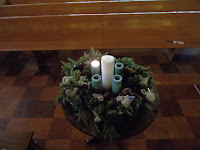This is the first Sunday of December so we will be celebrating the sacrament of Communion.
The Scripture Readings for this week are:
- Isaiah 11:1-10
- Psalm 72:1-7, 18-19
The Sermon title is The One Who Brings Change and Peace
Early Thoughts: It seems too good to be true. It could not possibly happen....could it?
At first glance Isaiah's portrayal of the Peaceable Kingdom seems to be a bit of a pipe dream. Actually it seems a little farfetched at a second, third and one hundredth glance too! What kind of a leader can make these things happen? Who is this shoot from the stump of Jesse?
For Christians, of course, the shoot from the stump of Jesse (father of David) is seen to be Jesus of Nazareth, the Messiah, born in David's town of David's line. There is a strong tradition that the original hearers of Isaiah's words might have thought King Hezekiah was the one who would bring these things about. Scripture tells us that Hezekiah was a Godly king and leader who did many good things, but he did not bring about the Peaceable Kingdom. Has Jesus? Will Jesus?
What level of change is needed for ancient enemies, predator and prey, to lie quietly together. If you think back to Genesis and Adam and Eve, you may remember that the serpent and the human were told they would be enemies "I will put enmity between you and the woman, and between your offspring and hers; he will strike your head, and you will strike his heel.”" (Genesis 3:15). But in the Peaceable Kingdom foretold by Isaiah "The nursing child shall play over the hole of the asp, and the weaned child shall put its hand on the adder’s den." (Isaiah 11:8) What wizardry is this?
We are not there yet. Some days I wonder if we are even getting closer...
Ancient hatreds, and new hatreds for that matter, still seem very powerful. In Isaiah 10:1-2 we are told that the Northern Kingdom (Israel) has fallen to the Assyrians because of their failure to care for the least in their society: the needy, the poor, the widows and orphans. How do we measure up on that account? Is the Peaceable Kingdom really just a dream?
Maybe. But we are called to be dreamers. Maybe it seems beyond possibility, but so does resurrection.
The Psalm reading this week is a prayer for the king. But I suspect it was a prayer for a king who never really existed. It sounds to me like a prayer that the king will live up to an ideal, an ideal that few (if any) monarchs in history could claim as their legacy. There is, however, a lot of overlap between this ideal king and the leader described in Isaiah 11 [no doubt this is why the passages were linked by the lectionary creators]. We need ideal leadership if we are going to get to the Peaceable Kingdom. And one of the markers of the ideal leader (in both Psalm 72 and Isaiah 11) is a passion for and commitment to justice for the people at the margins of society. The path to peace is paved with justice and equity, righteousness and faithfulness.
The promise of Christmas, the promise of Jesus, the Word-Made-Flesh is a transformed world. The promise of Emmanuel, God-With-Us, is that peace and justice are more than a dream -- they are a real possibility that will one day be a reality.
It may seem improbably as we look at the world around us. It my seem that we are incapable of that much change. But the promise is there. Jesus is coming. Jesus will bring transformed hearts, repentant people who go a different way, and the Peaceable Kingdom is waiting. As the old prayer says: Thy kingdom come, thy will be done.
--Gord






